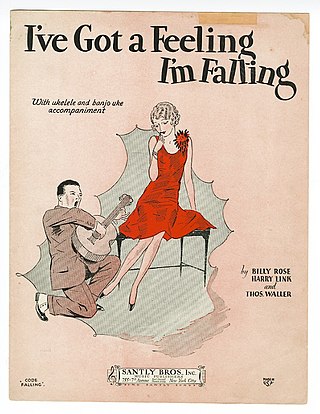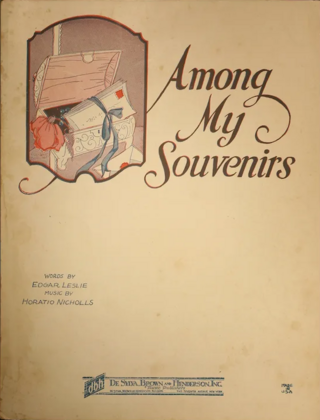"How High the Moon" is a jazz standard with lyrics by Nancy Hamilton and music by Morgan Lewis. It was first featured in the 1940 Broadway revue Two for the Show, where it was sung by Alfred Drake and Frances Comstock. In Two for the Show, this was a rare serious moment in an otherwise humorous revue.
"Wheel of Fortune" is a popular song written by Bennie Benjamin and George David Weiss and published in 1951. It is best remembered in the 1952 hit version by Kay Starr.
"Blue Tango" is an instrumental composition by Leroy Anderson, written for orchestra in 1951 and published in 1952. It was later turned into a popular song with lyrics by Mitchell Parish. Numerous artists have since covered "Blue Tango".
"Blues in the Night" is a popular blues song which has become a pop standard and is generally considered to be part of the Great American Songbook. The music was written by Harold Arlen, the lyrics by Johnny Mercer, for a 1941 film begun with the working title Hot Nocturne, but finally released as Blues in the Night. The song is sung in the film by William Gillespie.
"Love Me or Leave Me" is a popular song written in 1928 by Walter Donaldson with lyrics by Gus Kahn. The song was introduced in the Broadway musical comedy Whoopee!, which opened in December 1928. Ruth Etting's performance of the song was so popular that she was also given the song to sing in the play Simple Simon, which opened in February 1930.
"Guilty" is a popular song published in 1931. The music was written by Richard A. Whiting and Harry Akst. The lyrics were written by Gus Kahn. Popular recordings in 1931 were by Ruth Etting, Wayne King and by Russ Columbo.
"So in Love" is a popular song, written by Cole Porter, from his musical Kiss Me, Kate, which was based on Shakespeare's The Taming of the Shrew. It was sung in the show by Patricia Morison, reprised by Alfred Drake, and further popularized by Patti Page in 1949.
"If (They Made Me a King)" is a popular song with music written by Tolchard Evans and the lyrics written by Robert Hargreaves and Stanley J. Damerell. The song was written in 1934, but the most popular versions were recorded in 1950–1951. Perry Como's version, recorded November 28, 1950, was a number-one hit on the Billboard charts for eight weeks. The Como version was released under the following labels and catalog numbers:
"Wake the Town and Tell the People" is a popular song with music by Jerry Livingston and lyrics by Sammy Gallop, published in 1955. This song is a wedding day number complete with the chorus imitating the sound of wedding bells, as well as the sounds of the real chimes.
"Sometimes I'm Happy" is a popular song. The music was written by Vincent Youmans, the lyrics by Irving Caesar. The song was originally published in 1923 under the title "Come On And Pet Me," with lyrics by Oscar Hammerstein II and William Cary Duncan.
"A Garden in the Rain" is a popular song. The music was composed by Carroll Gibbons, the lyrics by James Dyrenforth. The song was published in 1928. The song was first recorded by the composer, Carroll Gibbons with the Savoy Hotel Orpheans and vocals by George Metaxa, in July 1928.

"I Found a Million Dollar Baby (in a Five and Ten Cent Store)" is a popular song.
"Hoop-Dee-Doo" is a popular song published in 1950 with music by Milton De Lugg and lyrics by Frank Loesser.
"More Than You Know" is a popular song, composed by Vincent Youmans with lyrics by Billy Rose and Edward Eliscu. The song was published in 1929.
"That's My Desire" is a 1931 popular song with music by Helmy Kresa and lyrics by Carroll Loveday.
"I Don't Know Why (I Just Do)" is a 1931 popular song.

"I'm Always Chasing Rainbows" is a popular Vaudeville song. The music is credited to Harry Carroll, but the melody is adapted from Fantaisie-Impromptu by Frédéric Chopin. The lyrics were written by Joseph McCarthy, and the song was published in 1917. It was introduced in the Broadway show Oh, Look! which opened in March 1918. The song was sung in the show by the Dolly Sisters. Judy Garland sang it in the 1941 film Ziegfeld Girl. It was subsequently sung by Jack Oakie in the 1944 film The Merry Monahans and was again featured in the 1945 film The Dolly Sisters, where it was sung by John Payne. It was also included for part of the run of the 1973 revival of Irene. Additionally, the pre-chorus would not have been included until later covers in the 1940s, where the song would gain it's iconic libretti.

"I've Got a Feeling I'm Falling" is a popular song with music by Fats Waller and Harry Link and lyrics by Billy Rose, published in 1929. In 1929, right after its publication, a very large number of different recordings were made ; afterwards, the song has become a popular standard, recorded by many people.

"Darktown Strutters' Ball" is a popular song by Shelton Brooks, published in 1917. The song has been recorded many times and is considered a popular and jazz standard. There are many variations of the title, including "At the Darktown Strutters' Ball", "The Darktown Strutters' Ball", and just "Strutters' Ball".

"Among My Souvenirs" is a 1927 song with words by Edgar Leslie and music by Horatio Nicholls.





